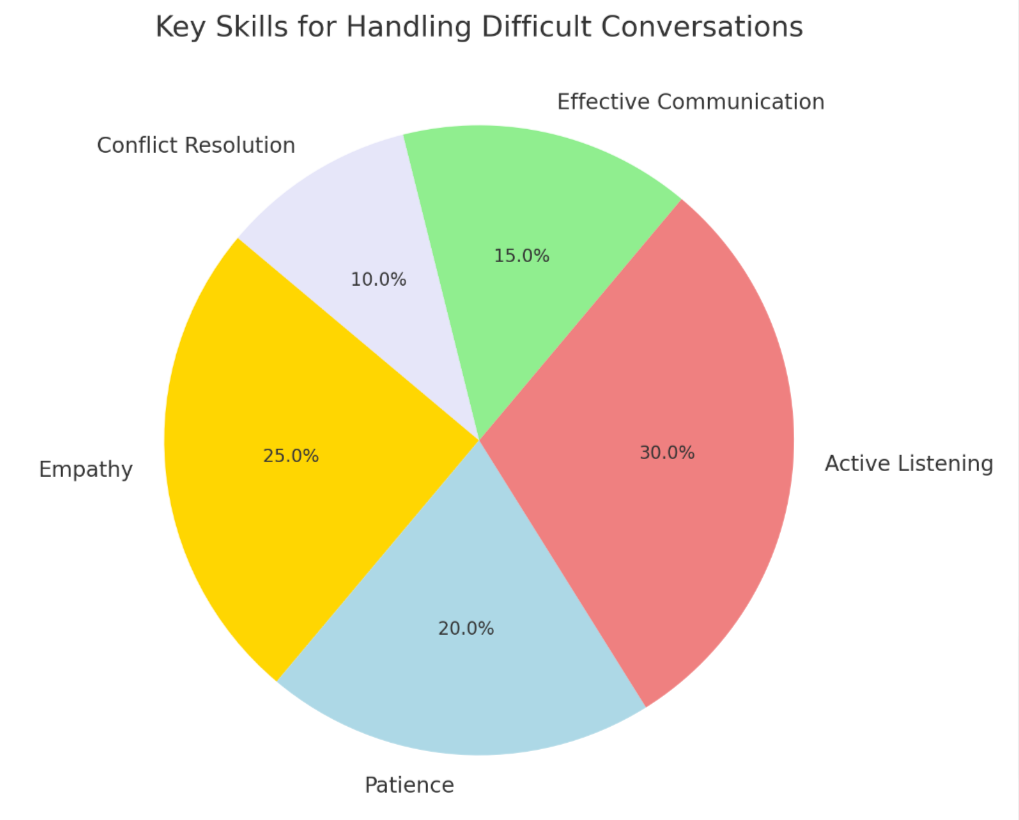Transforming Challenges into Lessons: Live Chat Agents’ Guide to Difficult Conversations
Dealing with tough customers is a part of live chat support that can be really tricky. Agents often face conversations that test their patience and skills. Our guide offers strategies to transform difficult chats into valuable learning experiences, no matter how challenging they get.
Keep reading – you’ve got this!
Key Takeaways
- Live chat agents can turn tough conversations into learning experiences by embracing diversity, improving communication skills, and building strong customer relationships.
- Effective handling of difficult conversations involves practicing active listening, showing empathy, and staying calm under pressure.
- After challenging chats, reflecting on the conversation helps identify improvement areas and aids in developing better strategies for future interactions.
- Agents should continuously seek feedback and engage in training to enhance their abilities to navigate complex customer service scenarios effectively.
- Implementing de-escalation techniques and problem-solving skills are key to resolving conflicts during live chat support sessions.
Benefits of Learning from Difficult Conversations
Understanding diversity and inclusion in the workplace is crucial for live chat agents to provide effective customer support. Improving communication skills and building stronger relationships with customers are also key benefits of learning from difficult conversations.
Understanding diversity and inclusion in the workplace
Diversity and inclusion in the workplace are about valuing every individual’s unique identity, background, and experiences. When live chat agents recognize these differences, they can tailor their communication to better connect with customers from various cultures and walks of life.
Embracing diversity not only enhances problem-solving and creativity but also helps in managing challenging conversations more effectively.
Inclusive workplaces encourage team members to bring their whole selves to work, leading to a richer customer service experience. Live chat support benefits from this approach as it allows agents to demonstrate empathy and understanding towards a wide array of customer needs and perspectives.
By actively practicing inclusivity, live chat agents are well-equipped for handling difficult customers with respect and sensitivity, paving the way for meaningful interactions that go beyond mere transactions.
Improving communication skills
Effective communication is key for live chat agents when managing challenging conversations. It’s about more than just exchanging information; it involves understanding the emotions and intentions behind the words.
Agents should aim to hone their active listening skills, which allows them to better comprehend customer needs and respond thoughtfully. Techniques like paraphrasing what a customer has said can show that the agent genuinely listens and cares.
Developing these skills leads to quicker problem-solving during live chat support interactions. By clearly articulating solutions and confirming understanding, agents avoid confusion and build trust with customers.
They can handle difficult customers by responding with empathy, using positive language that focuses on what can be done rather than dwelling on limitations or problems. Moving beyond basic communication ability, agents who excel in deescalation techniques often turn tough conversations into rewarding exchanges that leave both parties satisfied.
Next comes building stronger relationships with customers..
Building stronger relationships with customers
Having honed your communication skills, taking the next step towards building stronger relationships with customers becomes seamless. By engaging in meaningful conversations, even during a challenging interaction, live chat agents can turn tough situations into opportunities for growth.
It’s about showing genuine concern and understanding customer needs which fosters trust and loyalty over time.
A key tactic is to employ empathy consistently; this means really hearing what the customer is saying and responding with solutions that show you value their satisfaction. Personalizing each interaction goes a long way – remember names, previous concerns, preferences – all of these details make customers feel important and respected.
With every resolved issue or positively managed difficult conversation, you’re not just solving problems but also creating advocates for your service who are likely to return because they had an exceptional experience.
Gaining valuable experience and knowledge
Dealing with challenging conversations provides live chat agents with valuable experience and knowledge that can be applied in various aspects of their professional and personal lives, strengthening their problem-solving abilities and emotional intelligence.
Through these interactions, agents develop a deeper understanding of effective communication skills, conflict resolution strategies, and empathy, which are essential for providing exceptional customer service.
This hands-on experience equips them with the confidence to navigate tough conversations at work and beyond, contributing to their overall growth and development in handling difficult situations.
Navigating difficult conversations also allows live chat agents to gain valuable insights into customer behavior and preferences, helping them tailor their approach to better meet the needs of diverse customers.
Preparing for Difficult Conversations
Understand the importance of diversity and inclusion training, practice active listening and empathy, and develop a positive mindset and attitude when approaching challenging conversations.
Want to learn more about how to prepare for difficult conversations? Keep reading!
Understanding the importance of diversity and inclusion training
Diversity and inclusion training is crucial in fostering a supportive and respectful work environment. Recognizing and valuing individual differences builds stronger team dynamics, empathy, and understanding among employees.
This type of training also plays a pivotal role in equipping live chat agents with the skills needed to communicate effectively with customers from diverse backgrounds and experiences, ultimately enhancing customer satisfaction.
By embracing diversity and inclusion, companies can benefit from improved problem-solving abilities, creativity, and innovation.
Practicing active listening and empathy
After understanding the importance of diversity and inclusion training, chat agents need to practice active listening and empathy to effectively navigate difficult conversations.
- Active Listening
- Empathy Building
- Nonverbal Cues
- Validation Techniques
- Emotional Regulation
- Perspective Taking
- Communication Adaptation
Developing a positive mindset and attitude
Developing a positive mindset and attitude is crucial for managing difficult live chat conversations effectively. It helps in staying calm, focused, and empathetic. Here are some key steps to develop a positive mindset and attitude:
- Cultivate resilience by embracing challenges as opportunities for growth rather than obstacles.
- Practice self-care to maintain mental and emotional well-being, such as engaging in stress-relieving activities or seeking support from colleagues.
- Embrace a problem – solving approach that focuses on finding solutions rather than dwelling on the difficulties.
Navigating Difficult Moments During Conversations
Recognizing emotional triggers and staying calm is essential for live chat agents when navigating challenging moments. Using effective communication techniques and problem-solving skills can help resolve conflicts and find solutions during difficult conversations.
Recognizing emotional triggers and staying calm
Recognizing emotional triggers is essential for live chat agents in managing challenging conversations with customers. Staying calm enables agents to handle difficult situations effectively.
- Acknowledge your emotions without judgment. Identify the specific feelings that arise during the conversation, such as frustration, anger, or impatience. This self-awareness helps you remain in control of your reactions.
- Take a moment to breathe and center yourself before responding. Deep breathing techniques can help regulate emotions and maintain composure during tense interactions.
- Focus on the customer’s needs and concerns rather than personal reactions. Redirecting attention towards problem-solving facilitates a more constructive approach to the conversation.
- Practice mindfulness by staying present in the moment and avoiding assumptions or jumping to conclusions about the customer’s intentions.
- Implement de – escalation techniques when emotions run high, such as acknowledging the customer’s frustrations and expressing empathy for their experience.
Using effective communication techniques
To manage challenging conversations effectively, live chat agents should utilize various communication techniques. These include:
- Active Listening: Paying full attention to the customer’s words and non-verbal cues to understand their needs thoroughly, using phrases like “I see” or “I understand” to show empathy and engagement.
- Clear and Concise Language: Using simple and understandable language to convey information without causing confusion.
- Empathetic Responses: Demonstrating understanding and compassion towards the customer’s situation, even when resolving issues.
- Open-ended Questions: Encouraging customers to elaborate on their concerns by asking questions that prompt detailed responses.
- Positive Reinforcement: Acknowledging the customer’s patience or understanding during difficult conversations to maintain a positive rapport.
- Conflict Resolution Techniques: Utilizing problem-solving skills to address issues while maintaining professionalism and mutual respect.
Resolving conflicts and finding solutions
Resolving conflicts and finding solutions is crucial when navigating difficult conversations. Here are essential steps to effectively manage challenging situations and achieve resolution:
- Identify the root cause of the conflict by actively listening to the customer’s concerns and clarifying any misunderstandings.
- Work collaboratively with the customer to explore potential solutions, demonstrating empathy and understanding throughout the process.
- Utilize problem – solving techniques to creatively address the conflict, aiming for mutually beneficial outcomes.
- Communicate transparently with the customer, discussing possible resolutions and seeking their input on how to move forward.
- Take proactive measures to prevent similar conflicts in the future by implementing changes based on lessons learned from the conversation.
- Follow up with the customer after implementing solutions to ensure satisfaction and maintain a positive relationship.
- Seek feedback from supervisors or colleagues on strategies used for conflict resolution, continuously improving your approach to handling difficult conversations.
Repairing and Recuperating After Difficult Conversations
After a challenging conversation, take time to reflect on what went well and what could have been improved. Use this reflection to identify areas for growth and implement changes for future conversations.

Reflecting on the conversation
After engaging in a challenging conversation, taking time to reflect on the interaction can be valuable. By reflecting on what took place during the conversation and assessing your responses, you can identify areas for improvement and growth.
This self-reflection process allows you to gain insight into your communication style, emotional triggers, and problem-solving techniques. Analyzing the conversation also provides an opportunity to recognize successful strategies that were used and implement them in future interactions with customers.
Through reflection, live chat agents can continuously enhance their chat handling skills and effectively navigate difficult conversations with customers.
Identifying both strengths and weaknesses from the difficult conversation helps live chat agents develop a proactive approach to improving their communication skills. Reflecting on specific situations enables individuals to fine-tune their conflict resolution abilities while fostering empathy and understanding in customer interactions.
Identifying areas for improvement
To identify areas for improvement, Live Chat Agents can review past difficult conversations and assess their performance. They can pay attention to customer feedback, noting recurring issues or complaints.
Additionally, agents can seek input from supervisors or colleagues to gain different perspectives on their communication style and problem-solving strategies. Analyzing these areas will help agents pinpoint specific aspects of their approach that may need refining, such as active listening skills, empathy in challenging situations, or de-escalation techniques during emotionally charged exchanges.
Furthermore, Live Chat Agents should also consider utilizing available resources like training programs or workshops focused on conflict resolution and effective communication. Such initiatives can provide valuable insights and practical techniques for addressing shortcomings identified during difficult conversations with customers.
Implementing changes for future conversations
To improve future conversations, consider the following steps:
- Reflect on the conversation to identify areas for improvement.
- Seek feedback from supervisors or colleagues to gain different perspectives.
- Adapt communication techniques based on past experiences with difficult conversations.
- Implement active listening and empathy as primary tools in future conversations.
- Develop specific strategies for handling diverse and challenging customer interactions.
- Regularly review and update communication skills based on ongoing learning experiences.
- Practice de – escalation techniques to effectively manage emotional customer responses.
- Engage in continuous training to enhance conflict resolution abilities and problem – solving skills.
- Monitor progress and adjust approaches for managing tough conversations based on outcomes.
Conclusion
Agents benefit from learning through difficult conversations by understanding diversity in the workplace, improving communication skills, and building stronger customer relationships.
Preparation involves understanding diversity and inclusion training, practicing active listening, and developing a positive mindset. Navigating tough moments during chats requires recognizing emotional triggers, using effective communication techniques, and resolving conflicts with solutions.
After challenging discussions, reflecting for improvement is vital while implementing changes for future engagements supports growth and progress.

